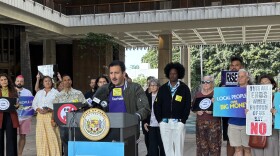Oʻahu bars and nightclubs are now required to stock naloxone, commonly known as the brand Narcan, which can reverse an opioid drug overdose.
That mandate could be expanded to restaurants and hotels statewide under a bill going through the Legislature.
"There's not a lot of overdoses, fortunately, in our restaurants and bars. But again, it's kind of like a fire extinguisher, you know, when you need it, you really need it," said Honolulu Emergency Medical Services Director Dr. James "Jim" Ireland.
He said a Honolulu Zippy's restaurant employee was able to save a man by using Narcan before an ambulance arrived.
Honolulu first responders recently reported the growing need to use naloxone. The Centers for Disease Control and Prevention reported that fatal drug overdoses, driven by fentanyl, reached nearly 108,000 in 2022. That number was nearly 107,000 in 2021.
"When I look back over the last two years and think about things, these overdoses tend to steadily increase every few weeks, a couple more, a couple more, a couple more. And then the police department and the DEA and all the folks in law enforcement make a publicized arrest. And they take two or three major dealers, you know, off the streets and they arrest them. And then you see the overdoses immediately, like within a week, drop way off," Ireland said.
But that decline lasts for four to six months, and then the overdoses go up again, he said.
"More than anything, we're seeing it in the homeless encampments and especially encampments on the fringes of Chinatown, Iwilei, ʻAʻala Park. We're seeing almost every day somebody overdose in that area," Ireland said.
"We really want to get health and harm reduction folks out there with the counselors to really try to offer people options to get into therapy and treatments so they can kind of break the cycle of narcotic abuse."
Ireland commented that overdose statistics only include the most severe reactions that require ambulances or lead to death, not nonfatal overdoses treated in private spaces.
This story aired on <i>The Conversation</i> on March 21, 2024. The Conversation airs weekdays at 11 a.m. on HPR-1. Sophia McCullough adapted this story for the web.





